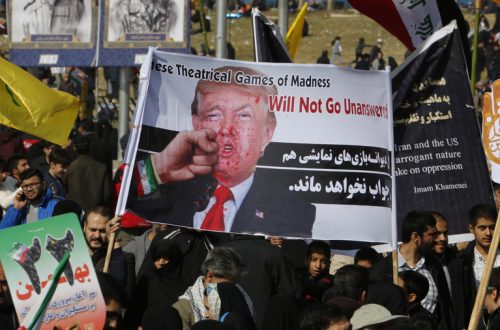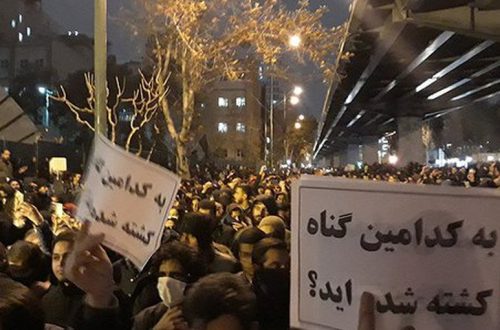This is a guest post by Garvan Walshe
Their Farsi name translates as “principlists.” They have believed for some time that the Revolution of 1979 had lost its way, timid in the face of a renewed urban liberalism, outmanoeuvred by wily politicians indistinguishable from the elite they replaced, humiliated by swaggering foreign powers. The small and unrefined Mahmoud Ahmadinejad became their unlikely spokesman and leader. (Ali Ansari, a professor at St Andrew’s University provides an excellent account of their rise here.
Former President Mohammed Khatami boasted to Norma Percy’s Iran and the West that he had outwitted the Supreme Leader. He said more or less “allow me to run for president; having your candidate face credible opposition will lend credibility to the election, and legitimacy to your man.” Khatami won by a landslide, and was re-elected by one four years later. He gave his voters a hint of the freedom the Revolution had promised but then liquidated. This was too much for the regime’s insiders – people like Akbar Hashemi Rafsanjani – who enjoyed their power and had grown intensely relaxed about being filthy rich. They used their control of Iran’s unelected institutions (diagram ) to disqualify reformist candidates, shut down their newspapers and imprison their supporters. In this the principlists would be useful allies.
Perhaps too useful. With reformists disillusioned, and with the energetic support of the Revolutionary Guards and the militias (such as the now infamous Basij), principlist Tehran mayor Ahmadinejad squeezed into a run-off with the unpopular Rafsanjani, which he won decisively on a relatively low turnout. Ahmadinejad built the presidency into an independent power base, while high oil prices allowed him to adopt Chavez-like make-believe economic policies, distributing potatoes (bread) to the poor, and organising holocaust denial conferences (circuses).
The insiders began to get nervous, for the populist principlists had them, and not just the reformists, in their sights. Worse, the principlists seemed to have been winning the battle for the Supreme Leader’s ear (for instance, Ahmadinejad managed to install his own man as nuclear negotiator). Yet Ali Khamene’i’s hold on that self-explanatory office is far from unquestioned. He was parachuted into the position by his Ayatollah Khomeini though he lacked the religious credentials the Supreme Leader is supposed to have. The endorsement of revolutionary hardliners and the military force at their disposal are thus very useful to him.
The battle lines have changed. Once Rafsanjani and his insiders had enlisted the hardline principlists to expel the reformists from the public sphere. But by the time of these elections, the contest had become between the principlists and insiders for control of the increasingly powerful executive institutions of the state. It was also a battle for money: both the Revolutionary Guards and the traditional elites have vast business interests. There now appears to be an alliance between the insider ‘conservatives’ and the popular reformist movement. Perhaps Mr Rafsanjani has been reading Lampedusa’s The Leopard, and agreed with Prince Fabrizio Salina that ‘things must change, so that they remain the same.’
If that was the plan, it didn’t survive Ahmadinejad’s blatant and preposterous falsification of the election. This was not a rigging, like Milosevic or Mugabe might attempt, by inflating turnout in the countryside and achieving just enough of an edge to force a run-off. For the results to have been credible we would have to believe that the millions who stayed away from the polls last time in disgust at the manipulation of the system against change had suddenly been transmuted into lovers of Ahmadinejad. The official ‘results’ claimed that Ahmadinejad had won amongst the Kurds. Even Mugabe didn’t pretend to win Matabeleland. Worse, the results were announced – despite the alleged record turnout – just a couple of hours after polls closed, from an interior ministry ringed by security forces to a country whose mobile phone networks had been switched off. There’s a word for this in Persian: koodetat. It doesn’t need translation, just say it out loud.
Iran’s constitutional theocracy had been torn up.
On Sunday, the young trendily dressed youth protested.

Perhaps this would peter out, like the protests in 1999 or 2003. Then, yesterday, Mousavi’s monster meeting:

Peaceful, disciplined, enormous. Ordinary looking office workers, even Tehran’s bin men came out:
So far violence from the regime has been isolated and limited. They are unlikely to be able to count on the regular army. I doubt the basijis who opened fire on the crowd were acting under orders. The regime, or rather those parts of it loyal to Ahmadinejad, is scared. The Supreme Leader has offered concessions, perhaps genuinely, possibly to buy time. But if the regime wins this confrontation the state terror will be severe: it will now only be able to keep power if it can teach the people fear again. No wonder Mousavi has said he will ‘pay any cost’ to contest the results.
Today, the stakes are higher still. Ahmadinejad has called a rally against ‘the anarchists’ ‘two hours before Mousevi, in the same place. This is about marking territory. Ahmadinejad has gone to Yekaterinburg, Russia, just west of Siberia, where Vladimir Putin is holding a summit Shanghai Cooperation Organisation dictators’ club. Nobody will have the authority to control his supporters if they get out of hand.
There have been reports reports of more violence in several cities across Iran. We have to hope the regime steps back from the brink


